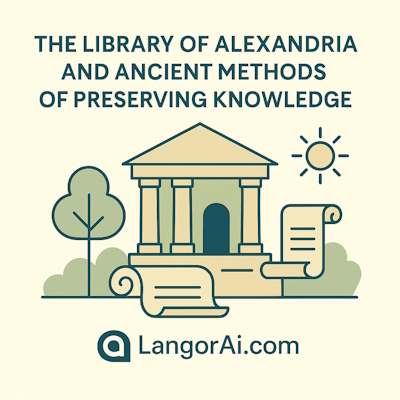
IELTS Reading Practice Test – Passage 1
The Library of Alexandria and Ancient Methods of Preserving Knowledge
The Library of Alexandria is remembered as one of the greatest intellectual institutions of the ancient world. Founded during the reign of Ptolemy I in the 3rd century BCE, it was intended not merely as a storage place for scrolls but as a research institution where scholars from various cultures could exchange ideas. Its mission was ambitious: to gather every written work in the known world and make Alexandria the global center of knowledge.
To achieve this, the Ptolemies implemented aggressive acquisition strategies. Ships entering Alexandria’s harbor were inspected, and any scrolls found on board were copied. The original scrolls were kept in the library, while the copies were returned to the owners. This policy was controversial but highly effective, allowing the library to accumulate an enormous collection of texts from Greece, Persia, Egypt, India, and beyond.
Preserving such knowledge, however, was an ongoing challenge. Scrolls were made from papyrus, a fragile material that deteriorated over time. To ensure longevity, scholars developed methods of climate control, storing scrolls in dry and shaded rooms where humidity was minimized. Additionally, multiple copies were created to protect important works from physical decay or accidental damage.
The library was closely connected to the Mouseion, an academic institution where scholars lived and worked. They were provided with stipends, free housing, and meals by the state, allowing them to devote themselves entirely to study. This level of government support was unusual and signified the value placed on knowledge and learning. Scholars in Alexandria contributed to mathematics, astronomy, geography, and medicine, producing works that influenced civilizations for centuries.
Despite its impressive influence, the fate of the Library of Alexandria remains a subject of debate. Some historians argue that it was destroyed in a single catastrophic event, possibly when Julius Caesar set fire to the harbor in 48 BCE. Others believe the decline occurred gradually, through neglect, political instability, and religious conflict. Regardless of the details, the loss of the library represents a profound cultural tragedy.
Nevertheless, the legacy of the Library of Alexandria continues to shape modern thinking about knowledge preservation. Modern libraries and digital archives follow similar principles: collecting widely, protecting against decay, and ensuring open access to information. The dream of Alexandria—to gather and preserve the totality of human knowledge—still influences our efforts today.
Questions 1–7 (True / False / Not Given)
Questions 8–10 (Multiple Choice)
A) Passive
B) Aggressive
C) Ineffective
D) Accidental
A) Their scarcity
B) The fragility of papyrus
C) Poor translation methods
D) Overproduction of copies
A) Political instability
B) Religious conflict
C) A single large fire
D) Lack of interest from scholars
Questions 11–13 (Short Answer)
Answer in ONE or TWO words only.
Answer Key & Explanations
1 → False – The library was also a research institution.
2 → True – Ships’ scrolls were copied and originals kept.
3 → False – Papyrus was fragile and deteriorated easily.
4 → True – Scholars received stipends and housing.
5 → Not Given – The passage states scholars disagree.
6 → True – Contributions included astronomy, math, etc.
7 → True – Modern archives continue the goal.
8 → B – Acquisition policy was aggressive.
9 → B – Papyrus fragility made preservation difficult.
10 → D – Passage does not mention scholars losing interest.
11 → Papyrus
12 → Mouseion
13 → Digital
